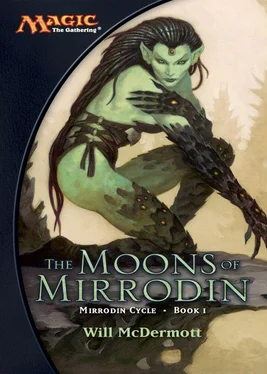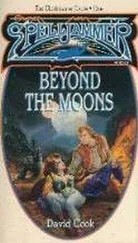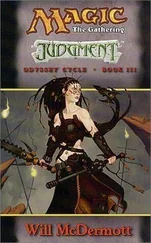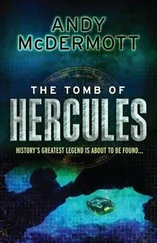Will McDermott - The Moons of Mirrodin
Здесь есть возможность читать онлайн «Will McDermott - The Moons of Mirrodin» весь текст электронной книги совершенно бесплатно (целиком полную версию без сокращений). В некоторых случаях можно слушать аудио, скачать через торрент в формате fb2 и присутствует краткое содержание. Год выпуска: 2011, ISBN: 2011, Издательство: Wizards of the Coast Publishing, Жанр: Фэнтези, на английском языке. Описание произведения, (предисловие) а так же отзывы посетителей доступны на портале библиотеки ЛибКат.
- Название:The Moons of Mirrodin
- Автор:
- Издательство:Wizards of the Coast Publishing
- Жанр:
- Год:2011
- ISBN:978-0-7869-5915-0
- Рейтинг книги:3 / 5. Голосов: 1
-
Избранное:Добавить в избранное
- Отзывы:
-
Ваша оценка:
- 60
- 1
- 2
- 3
- 4
- 5
The Moons of Mirrodin: краткое содержание, описание и аннотация
Предлагаем к чтению аннотацию, описание, краткое содержание или предисловие (зависит от того, что написал сам автор книги «The Moons of Mirrodin»). Если вы не нашли необходимую информацию о книге — напишите в комментариях, мы постараемся отыскать её.
The Moons of Mirrodin — читать онлайн бесплатно полную книгу (весь текст) целиком
Ниже представлен текст книги, разбитый по страницам. Система сохранения места последней прочитанной страницы, позволяет с удобством читать онлайн бесплатно книгу «The Moons of Mirrodin», без необходимости каждый раз заново искать на чём Вы остановились. Поставьте закладку, и сможете в любой момент перейти на страницу, на которой закончили чтение.
Интервал:
Закладка:
Will McDermott
The Moons of Mirrodin
PROLOGUE
Memnarch stood in the guard house and watched Karn and Jeska leave. It was a strange phenomenon. One moment they were there and the next moment they were gone. It was as if the world had folded over and passed them by in an instant. In that instant, Memnarch was alone. A metal man alone in a metal world, a cold and sterile world.
Memnarch looked around at Argentum, Karn’s world. It was beautiful. It was perfect, like an equation that had been solved to the very last decimal place. But the mathematician had moved on to a new problem, leaving Memnarch to tend the theorems and keep all the formulas in place.
“Now I am the Warden,” said Memnarch as he walked from the guardhouse and surveyed the palace grounds. “Let’s see what this world has to offer.”
The metal man was awed by the size and intricacy of the palace. Each wall, each window, each buttress was but a single facet in a convoluted pattern or complex equation. Minarets extended at impossible angles, walls curved around one another, connecting top to bottom, and many of the buttresses indeed seemed to be flying. Silver walls and translucent windows met in a space that seemed to extend to infinity. It was a marvel of complicated algorithms and fractal mathematics, a wonder to behold.
The new Warden felt he could spend a thousand lifetimes delving into the secrets of his master’s world and the incredible castle Karn had constructed. He stood on the grounds contemplating the fractal facets of the walls, the impossible curves of the arches, and the elegance of the extra-planar geometry Karn had mastered as a planeswalker. But time had no real meaning to Memnarch. He was an artificial being on an artificial plane with no frame of reference for the linear passage of time. Argentum had no suns or moons, no rotation through space to give the metal man any sensation of time’s movement. An outside observer might have thought the Warden was a statue on the grounds of the fabulous castle.
After a time-a decade by some standards of timekeeping-Memnarch turned to look at the grounds around the base of Galdroon palace. Galdroon. That’s what Karn had named the castle, just as he had named the world Argentum. Karn was gone now. Memnarch could name the world and its places himself if he wished, but would that be too presumptuous? Too arrogant? Karn was a planeswalker, a god by most definitions of the word. What right did Memnarch have to take on the role of god on Karn’s world?
Yet, as he walked through the grounds, Memnarch began to realize that even Karn was not a perfect being. His gardens were less impressive than the castle-stale and sterile. Each silvery tree, bush, and flower was arranged in mathematical precision. Each leaf on every tree was unique, but as Memnarch studied them he began to understand the mathematics behind their construction. The total variations limited the number of each tree, shrub, and flower to no more than eight of any single type. Karn’s mathematics could not create nature, only give the illusion of reality in his world. Memnarch longed for more.
He left the grounds and venture out into the world around the castle. The stonelike metal and silver vegetation of the palace grounds gave way to a monochrome land of perfect angles and fractal complexity. The palace sat upon a great silver mesa, and Memnarch could see canyon walls stretching to the horizon. At first glance, Karn’s world looked natural, but up close Memnarch could see the silvery surfaces of the all-too-perfect rock formations.
Plateaus jutted up from the canyon floor at seemingly random locations, but Memnarch detected the subtle constant that permeated the random plateau generator. After a time-a few years, as time is measured among humans-he found it easy enough to map the entire canyon by viewing this one small section. Memnarch contemplated following the lazy, quicksilver river that meandered in a complex wave through the center of the canyon. The journey could verify his map, but that trip would be pointless. His calculations were correct. He knew this even without the proof.
As his eyes wandered over the canyon, Memnarch noticed rain falling near the horizon. He looked up. There were no clouds in the sky. For that matter, no sun provided light on this world. This information had, of course, been inside Memnarch from his beginning, but he noticed it now as if seeing it for the first time. The stars above provided all of the illumination necessary, for their light was reflected from the thousands of mirrored surfaces across Karn’s world. But if there were no clouds, how did it rain? The rain seemed to be coming from the stars themselves.
Memnarch studied the stars as he had studied the castle and the canyon. He stared at them and meditated on their creation. Another decade passed as Memnarch puzzled through the data imparted to him by Karn and reconciled it with observed physical details. This time, he had precious little information. The stars were not randomly dispersed through the heavens according to a formula. They were random, as were their movements. The stars did not revolve around the world. One year’s observation proved that. They moved haphazardly as if under their own power. The effect was subtle, and Memnarch noticed only because of the intellect Karn had imparted to him.
Memnarch was sure of one thing as he stood, mesmerized by the subtle dance of the stars through Argentum’s sky: These pinpoints of light were not created by Karn. They were living creatures the like of which Memnarch had never seen on Dominaria.
“Where did Karn find you?” he asked the sky.
Memnarch still had the memories of all that he had seen of Dominaria in his previous life. He had not thought of that life since Karn had re-created him as the Warden of Argentum. Finding living creatures on this sterile, mathematically perfect world had brought back a flood of images. Memnarch had once been a mirrored ball, a perfect sphere, the most basic geometric shape and thus the most stable-or so Karn had thought. Memnarch had been Karn’s eyes and ears on Dominaria.
A century after an invasion was turned back from that world-the invasion that turned Karn into a planeswalker-the silver golem had sent a probe there. A probe called the Mirari.
That had been Memnarch’s first life.
Spherical or not, the Mirari had been flawed. Power leaked out, infecting those around it with delusions of grandeur. Much strife and death had resulted from the Mirari’s influence on the people of Otaria, where the Mirari had landed. Memnarch let those memories flow through his mind and felt grief. He was no longer the cause of that trouble. He was a different being now. No longer just a probe, he had free will, given him by Karn so he might better handle the power of this body. Nevertheless, an uneasy feeling stirred in Memnarch that he was responsible for the chaos brought about by his presence on Dominaria.
As he stood there, watching the subtle, chaotic movement of the star-creatures, Memnarch couldn’t help but think that the rest of Karn’s well-ordered world could be improved upon with the addition of just a little more chaos. “Karn was wrong to omit Dominaria’s influence in the creation of this world,” he observed as he returned to the palace grounds.
Yes, there had been death and destruction on Dominaria. Perhaps Karn was right to turn his eyes from that world, but Dominaria held many wonders as well. Memnarch recalled lush green forests. He had visited multi-hued coral cities beneath the waves and rust-colored mountains topped with snow that threatened to overtake an azure sky. He had traveled across vast plains of grasses and grains that stretched from horizon to horizon. And he had seen people of bronze and black, blue and tan. As the Mirari, he had chronicled creatures of every shape and hue. That world had been alive and colorful.
Читать дальшеИнтервал:
Закладка:
Похожие книги на «The Moons of Mirrodin»
Представляем Вашему вниманию похожие книги на «The Moons of Mirrodin» списком для выбора. Мы отобрали схожую по названию и смыслу литературу в надежде предоставить читателям больше вариантов отыскать новые, интересные, ещё непрочитанные произведения.
Обсуждение, отзывы о книге «The Moons of Mirrodin» и просто собственные мнения читателей. Оставьте ваши комментарии, напишите, что Вы думаете о произведении, его смысле или главных героях. Укажите что конкретно понравилось, а что нет, и почему Вы так считаете.












